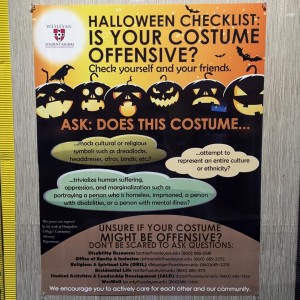The Chronicle of Higher Education has an interesting new interactive feature: why campus traditions matter. I don’t remember any traditions quite like these at the two institutions I attended as a student, or at the two institutions of which I was an employee prior to coming to SJSU. Perhaps I’ll learn about some that exist here!
Archive: Oct 2015
Inside Higher Ed is reporting that the California State University System has signed an agreement with a private company to make electronic portfolios (e-portfolios) available to its students and graduates. San Jose State is part of the CSU system, so I’ll have to keep an eye on this partnership as it rolls out. Any tool that helps students better highlight their accomplishments is something that we should encourage!
Halloween is coming up in a couple of weeks, so student affairs offices around the country are gearing up warnings about offensive Halloween costumes. I really like Wesleyan U’s poster campaign:
My college has a tradition of holding a lunch hour Halloween party. I’m not worried about anyone showing up in inappropriate gear. I’ll go as Darth Vader, and a few others will dress up in Star Wars costumes. I expect Boba Fett to make an appearance, along with at least two stormtroopers. Should be a fun event!
In a recent Chronicle of Higher Education article, sociologist Patricia Leavy argues, “let’s give student researchers the credit they deserve.” She notes,
Just as college students often serve as research samples because they are convenient populations for academic researchers, so too do students routinely serve as research assistants and co-authors. Credit and compensation is typically attributed to student collaborators based on individual negotiations with faculty mentors. In other words, whether the student is listed as a research assistant or a co-author, whether the student is listed as the lead author or a secondary author, or how the student’s contribution is both defined and monetarily compensated (especially with a work such as a book) is based on whatever arrangement the student strikes with the researcher (who is usually the student’s professor)…
Credit and compensation should be based on the level of collaboration and how much each collaborator has contributed to the final product; it should not be based on career level. It really is that simple.
Indeed!
The Atlantic‘s CityLab website has an interesting article: “Why Are Little Kids in Japan So Independent?” Here in the Unites States some call children who are allowed to travel and/or play without much adult supervision “free-range kids.” As a child growing up in the 1970s I remember a time when “free-range kids” were just “kids.” I wonder if the U.S. can ever return to that state…
Inside Higher Ed is reporting that the California State University System has signed an agreement with a private company to make electronic portfolios (e-portfolios) available to its students and graduates. San Jose State is part of the CSU system, so I’ll have to keep an eye on this partnership as it rolls out. Any tool that helps students better highlight their accomplishments is something that we should encourage!
Halloween is coming up in a couple of weeks, so student affairs offices around the country are gearing up warnings about offensive Halloween costumes. I really like Wesleyan U’s poster campaign:
My college has a tradition of holding a lunch hour Halloween party. I’m not worried about anyone showing up in inappropriate gear. I’ll go as Darth Vader, and a few others will dress up in Star Wars costumes. I expect Boba Fett to make an appearance, along with at least two stormtroopers. Should be a fun event!
In a recent Chronicle of Higher Education article, sociologist Patricia Leavy argues, “let’s give student researchers the credit they deserve.” She notes,
Just as college students often serve as research samples because they are convenient populations for academic researchers, so too do students routinely serve as research assistants and co-authors. Credit and compensation is typically attributed to student collaborators based on individual negotiations with faculty mentors. In other words, whether the student is listed as a research assistant or a co-author, whether the student is listed as the lead author or a secondary author, or how the student’s contribution is both defined and monetarily compensated (especially with a work such as a book) is based on whatever arrangement the student strikes with the researcher (who is usually the student’s professor)…
Credit and compensation should be based on the level of collaboration and how much each collaborator has contributed to the final product; it should not be based on career level. It really is that simple.
Indeed!
The Atlantic‘s CityLab website has an interesting article: “Why Are Little Kids in Japan So Independent?” Here in the Unites States some call children who are allowed to travel and/or play without much adult supervision “free-range kids.” As a child growing up in the 1970s I remember a time when “free-range kids” were just “kids.” I wonder if the U.S. can ever return to that state…

